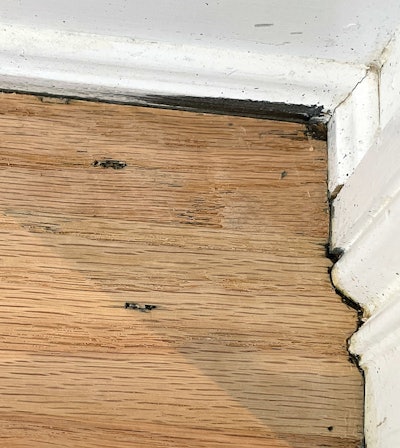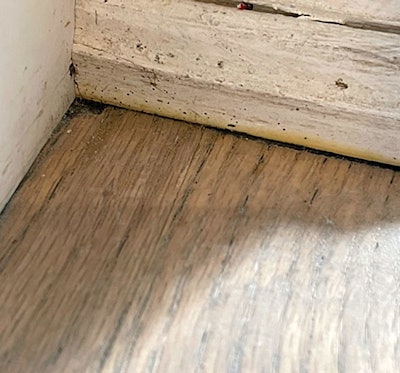
The best advice I've ever received in the wood flooring business is something Howard Brickman told me years ago when I was working for him as a helper: "The difference between an OK job and a great job is about 45 minutes." At first I was young and stupid and didn't grasp what he meant, but a few years later, as a crew leader and then as a business owner, I realized the wisdom of those words. It takes only maybe 45 minutes to walk around the job and check all the details to make sure everything is acceptable, but that 45 minutes will save you callbacks, spare you complaints, get you paid right away and result in customers becoming fans and recommending you to all their friends.
Fixating on details
What are those details? Maybe it's an edger mark or a barely noticeable drum mark, or maybe there's a small spot in the corner where one of your workers didn't scrape out a small area of crud, or maybe there's a scraper dig on the threshold. You're in a hurry, it's late and you just want to get done that day, so you let it go and just coat the floor. Now it's haunting you the rest of that evening ... "Gotta remember to fix that tomorrow" ... but you're slammed the next day so you don't fix it before the second coat. Or the third coat. You know it's there the entire time, but you're hoping and praying the customer doesn't notice and you'll get away with it.
We all know this is a fact of life: If the customer sees one of those flaws, they won't say anything after the first coat or even the second coat. They will wait until the final coat is done and you are showing up to collect your final check. They'll say something like, "The floors look great, but I noticed that a corner in this room has these marks—is there any way to fix those?"
Now you have a repair on your hands that will burn hours with not just the repair, but the multiple trips to the job. You're going to spend hours fixing something that literally should have been taken care of in 15 seconds—if you had paid attention or paused the job to just fix it when you saw it.
 Sometimes the details that can cause trouble aren't even anything you did: These splatters were from the last contractor who did the floor, but if you don't point them out to the homeowners before your work begins, they might think they are your fault.
Sometimes the details that can cause trouble aren't even anything you did: These splatters were from the last contractor who did the floor, but if you don't point them out to the homeowners before your work begins, they might think they are your fault.
Problems only multiply
You know what happens next: During the time between when they have that complaint and when you come back to make the repairs, the customer has grown suspicious. Their eyes are now trained like an eagle. They have been over the entire floor on their hands and knees looking for problems. As Howard would say, "Now they've got their lips on the floor with a magnifying glass," and there are 15 Post-It notes on different boards. They are sending you text messages all day and calling you over and over to ask about how fast you can fix their floor.
At this point you have options: You can keep going back to the job to make repeated repairs, or you can just say, "Forget it, I'm losing so much on this job that I'm done," and you just leave and don't come back. If you choose the latter, your last payment is not getting paid, and you've got a customer who is killing you all over social media or on your Google reviews.
Of course, spot finish repairs can be tricky (more on that later). Sometimes you'll fix it and it looks OK—but not as good as it should. Now it's negotiation time: "Well, I owe you $3,000, but I'm really not happy with how it looks, so I'm going to give you $1,400." You don't have all your money, and you've got a customer who is unhappy and will be out there saying, "Whatever you do, don't hire this guy." Now that little detail you didn't take care of is costing you time and stress and aggravation and your reputation.
Here's one of my own nightmares
How do I know this? You learn a million times more from your mistakes than you do from doing things right, and after decades of being a contractor, of course I sometimes learned the hard way. I had a hardwax oil job once where it was late at night after a long day, and we were coating the final 40 feet in the kitchen. There was one board in that floor that took the finish a little strangely. I wasn't sure what it was, but I decided to just leave it and see how it turned out when it dried.
To say the least, it turned out badly. I realized that one of my guys had leaned on the floor, putting a big sweat mark on that spot and raising the grain on the No. 2 oak. I talked with the builder and said I would come back in three days and fix it, but in the meantime he rented a buffer and put universal maintenance oil on top of it. Then of course I had to sand it, and at some point one of the homeowners stepped on the floor and left a footprint in it. To cut the story short, I had nothing but untold aggravation for an entire month because of this, and at the end of it the homeowner told me, "James, you are dead to me." A little melodramatic, yes. It actually cracked me up. But the killer was that I could have prevented the entire nightmare if I would have just stopped at the moment I saw that the board looked weird, crawled through the finish and dealt with it right then.
Sometimes on the Facebook groups I'll see the same guys with the same problems complaining about their customers and what a pain they are. But when the same problem happens to you enough times, you have to consider: What is the common denominator here? The manufacturer? The stain? The finish? The homeowner? No. The common denominator in all of these problems is YOU. Sometimes you have to take the painful step of looking in the mirror and asking how you are going to change things if you really want to stay in business. I know, I had to do it.
Biting the bullet: the resand
Like I mentioned, trying to chase these spot repairs can be time-consuming and doesn't always go well. Sometimes when I'm giving a recommendation to other pros, I've got to say the "R" word: resand. It's a horrible, disheartening word that nobody likes to hear. It isn't so much the fact that you have to get all the machines out and sand the floor all over again, it's also worrying about how this will impact your schedule and leave you working for free until midnight every night to get back on track. It's an entire mental thing that piles on you, but sometimes it's just better to rip off the Band-Aid, do the resand and be done.
Having to do a resand doesn't mean you're a horrible contractor or that the customer will hate you forever. It means you're doing the right thing to take care of your customer. I had a white-stain job on a small cottage once where my guys decided to skip the sealer. I came back and looked at it with the builder, and the floor had turned green. I said, "This ain't good; we're going to resand this." It was only about 700 feet, and as the builder handed me the check, he said, "James does it nice because James does it twice." What he said cracked me up, but it turned out to be significant. Because I had taken care of the screw-up right away, they called me back two months later to do all the other cottages in this beach compound, and later I ended up replacing the floors in the main house, for a total of about $80,000. If I had walked away from the green floor, it wouldn't have just cost me the $1,500 for that little job, but that entire 80 grand.
Those minutes save a lot
The extra half hour or 45 minutes you spend on every job checking the floor after sanding, after staining and between finish coats set your mind at ease knowing you went over all those little things that can make a job go so wrong. Every time your phone rings, you'll just be thinking, "Oh great, potential business!" instead of being terrified it's a customer calling you back about the mistakes you didn't fix on your last job. When you take those extra few minutes on every job, you leave the house with confidence every day, knowing that you aren't walking into a disaster of your own doing. After work, you can go home and look yourself in the mirror and your kids straight in the eye with the peace of mind from knowing that you gave your best every day. And a good living will follow.




























